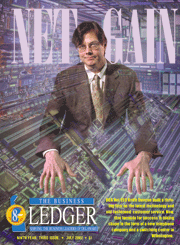


|
 Technology with the personal touch Technology with the personal touch
By DOUG RAINEY NEW CASTLE BUSINESS LEDGER STAFF WRITER DCA Net does not exactly fit the profile of many Internet service providers. Rather than having a so-called "virtual" presence, it established visibility on the street in Wilmington and Philadelphia. DCA also chose to pursue the business and institutional markets, relying on personal service and the latest technology rather than fire sale pricing. Instead of leasing office space, it bought its own buildings in Wilmington and Philadelphia. This month, DCA and its sister company, D-Tel (more about it later) are expected to complete their move into a location on Delaware Avenue in downtown Wilmington. The office will function as the state’s first co-location center, allowing businesses and organizations to set up their own web server systems in a secure environment, complete with a back-up generator and access to a fiber-optic line running to Philadelphia. The back-up system ran flawlessly during a recent power outage in downtown. The expansion into the former Cann printing building might seem to the casual observer to be a bet-the-farm proposition, made even riskier by the the near-depression conditions in the telecommunications industry. However, DCA founder and President Keith Duncan sees the Wilmington center as a necessity in positioning his companies for the continuing "convergence" between voice and data communications. Furthermore, he notes that both DCA and D-Tel are profitable, despite continuing investments in equipment and technology. DCA’s roots go back to the early 1990s and Duncan’s pursuit of a doctorate from the University of Pennsylvania Focusing on the human aspects of technology, Duncan’s doctoral work included a teaching assistantship and consulting work with faculty members. "I was tired of not being paid," he said of the consulting projects. Duncan decided to set up a firm that could handle projects and allow him to receive some compensation. In order to allow the firm to do a wide range of consulting work, it was given the vague name of Consult Dynamics. Duncan went on to earn his doctorate but found that teaching offers were few and far between. Although he had lived in Philadelphia during much of the time he was pursuing a doctorate, Duncan had maintained his ties to Delaware. After all, he had grown up in the New Castle, the son of a top manager at building materials supplier, Brosius-Eliason. In looking for opportunities, he continued to focus on Delaware, an approach that puzzled his colleagues at the Ivy League university. "I was definitely ‘Delawrecentric,’" he said. His roots in Delaware also gave him knowledge and contacts in the local business community. Duncan’s experience in academia had prepared him for the Internet revolution. After all, the system had largely been created and refined by the higher education system, long before it moved into the business and consumer areas. He formed DCA Net in 1993– using the name to reflect his belief that the business would succeed as a network of users, rather than a group of customers logging into a server. He also realized early on that wise use of the latest technology could set the firm apart from the many of the companies that were springing up at the time. In 1994, DCA connected its system to a high-speed T1 line. DCA also opted to target the business community, with a focus on personal service. This reflected Duncan’s doctoral research that indicated a need the personal touch in making technology work. A natural area for expansion was Philadelphia. DCA established a presence in Center City and established a facility in purchased space in Old City. The company now provides off-site for a number of institutions of higher learning in the city. The commitment to customer service and visibility paid off in the late 1990s when DCA managed to earn a Best of Philadelphia honor from Philadelphia magazine. In the late 1990s, ISPs were caught up in the "broadband" revolution as digital subscriber lines (DSL) were offered. DSL greatly increased speed, but also set the stage for a meltdown in the industry. "We didn’t anticipate the number of companies that appeared," Duncan said. Worse yet, they brought pricing that did not reflect the cost of providing the service and huge investments by investors who believed what now seem to be wildly optimistic projections. The situation was made worse by the need to work with what critics see as a reluctant and at times hostile local phone carriers. DCA stuck to its original strategy of not deeply discounting rates while retaining its customer service personnel. Duncan said that from an economic point of view local monopoly phone companies had no reason to be responsive to the needs of competitors. As it turned out, a number of providers of DSL went out of business as Wall Street lost its enthusiasm. Also a factor were allegations that Verizon and other Baby Bells put obstacles in the way of competitors that sealed their fates. Verizon officials claimed the failures were largely the result of unrealistic pricing. Duncan concedes that DCA took its lumps. Total employment of the company is now about 40. While not forced to lay off workers, the current headcount is below its peak. Duncan added that technology has played a role in making the company efficient. While not citing dollar figures, Duncan notes that the ratio of revenues to employees is higher than industry norms. Moving into the 1990s, DCA began to see the convergence between voice, data and Internet communications and took the seemingly bold step of forming its own telecommunications company D-Tel. While working with Verizon on DSL issues was not easy, it did not compare to the hurdles that come in forming a competing telecom company.. Duncan said it took a couple of years to be in a position to offer the service, which was kicked off last year. DCA has continued its traditionally low-key stance in offering telecom service. Asked whether the issue of convergence of computers and telecommunications has been over-hyped, Duncan is quick to answer yes. The small and mid-sized companies targeted by D-Tel will not throw out expensive equipment until it has been fully depreciated. However, D-Tel is positioned to offer an array of services when the business is ready to make a change, Duncan said. The new operations center in Wilmington will offer businesses and organizations the ability to closely tie their data and telecom operations to the services offered by DCA and D-Tel. Another promising market involves providing back-up service for bigger corporations in the event that they lose their main carrier. None of this means that DCA is ignoring other promising technologies. The company is currently testing a wireless system in Cecil County, Md. that would provide high-speed data access to businesses that cannot receive DSL service. (DSL availability is based on the length of a user from the telephone exchange and in rural and some suburban areas, many users are too far away from those exchanges). DCA also plans a wireless system that would serve businesses in the vicinity of its new Delaware Avenue center. The wireless technology is seen as an alternative to an environment where critics see the Comcasts and Verizons calling the shots. Like other ISPs, DCA continues to closely watch the issue of access to carriers, such as Verizon and Comcast. (The cable company does offer high-speed data and Internet services locally). So far, at least one court decision has sided in favor of cable and telecom companies not being forced to open their systems to other ISPs. Comcast is offering competitors access in some markets. The issue of competition has become even more important as rival carriers fall by the wayside in a wave of bankruptcies, Duncan said. The situation is made more complicated by the woes of long-distance carriers, such as AT&T and Worldcom. Those companies have battled Baby Bells in offering long-distance service and cite problems in access to DSL service. Verizon has petitioned federal authorities to offer long-distance service in Delaware, after seeing success in getting permission in other states. As those struggles go on, critics allege that the Baby Bells are reluctant to give much ground on issues such as access. "No one envisioned the current environment when the Telecommunications Act was passed," Duncan said. |
Cover
Story | Sections | About
TBL | Advertisers
Comments | News
Links | Subscription | Archive
E-mail TBL at: ledger@dca.net